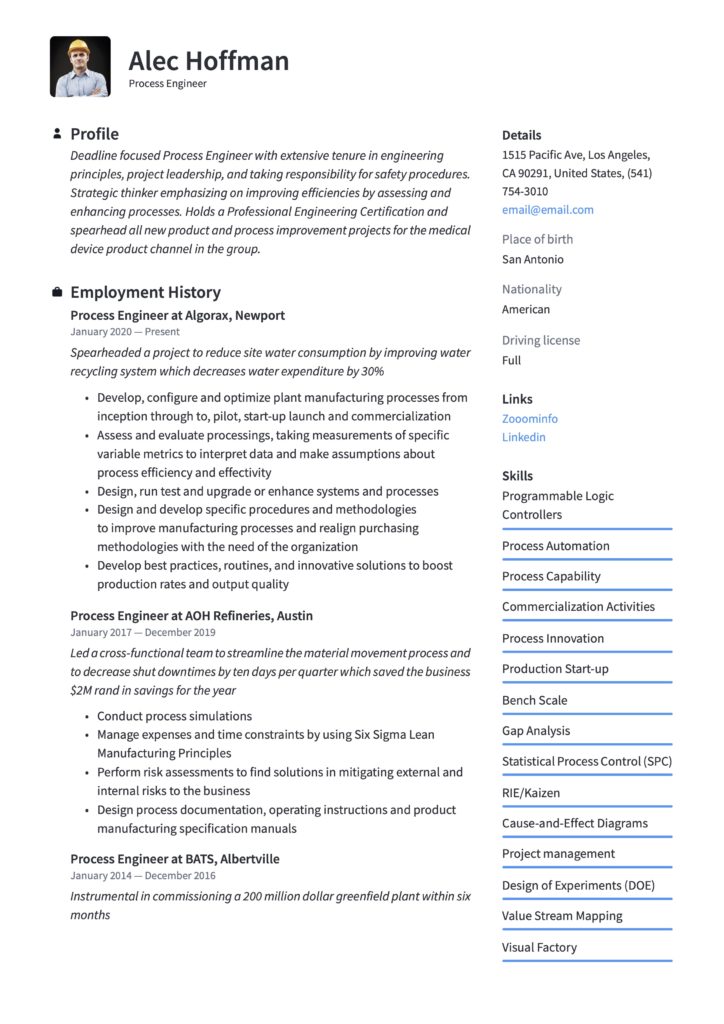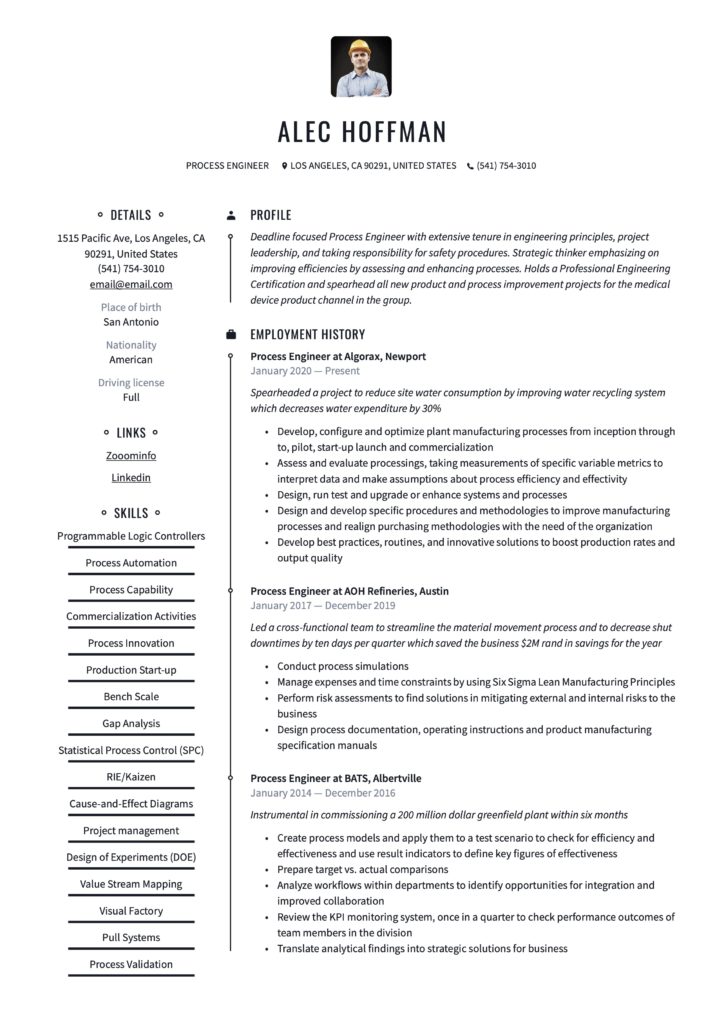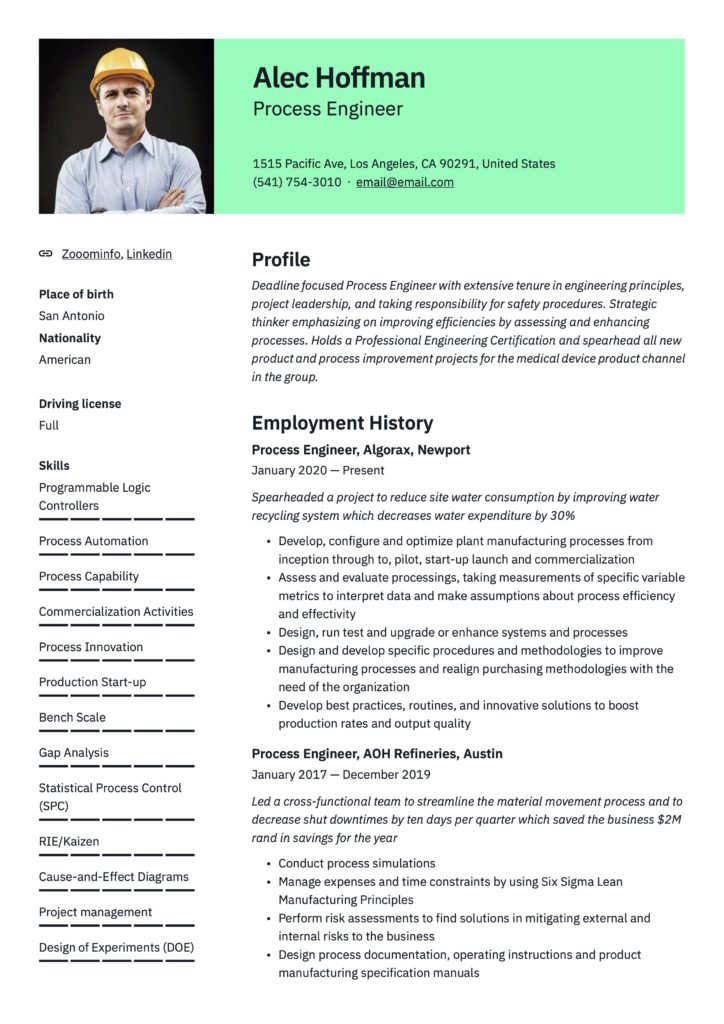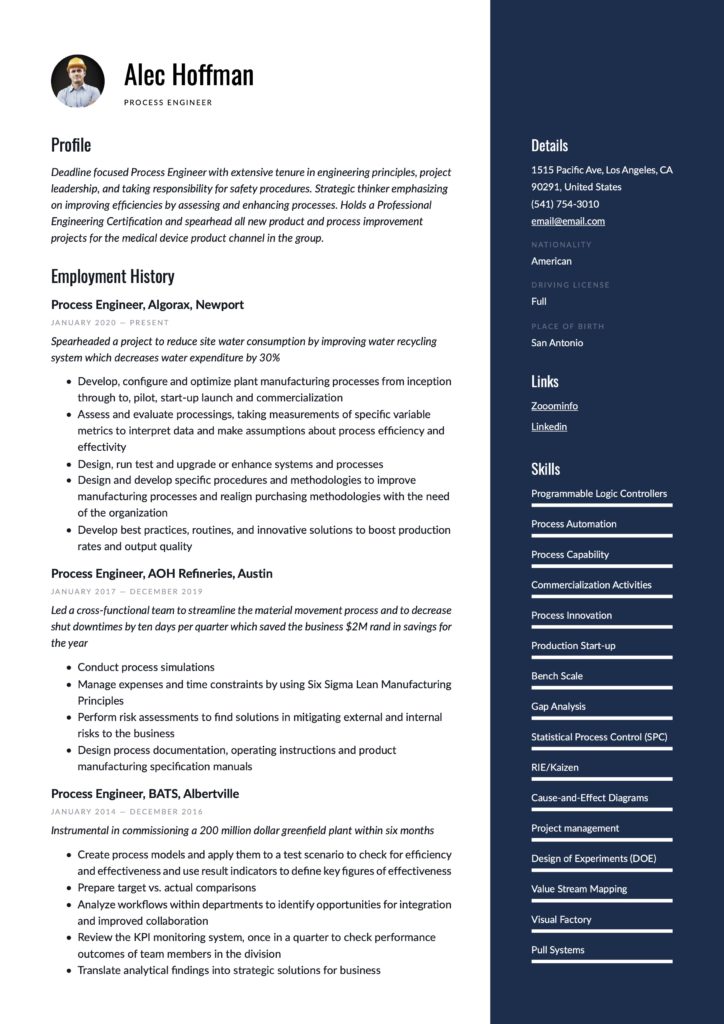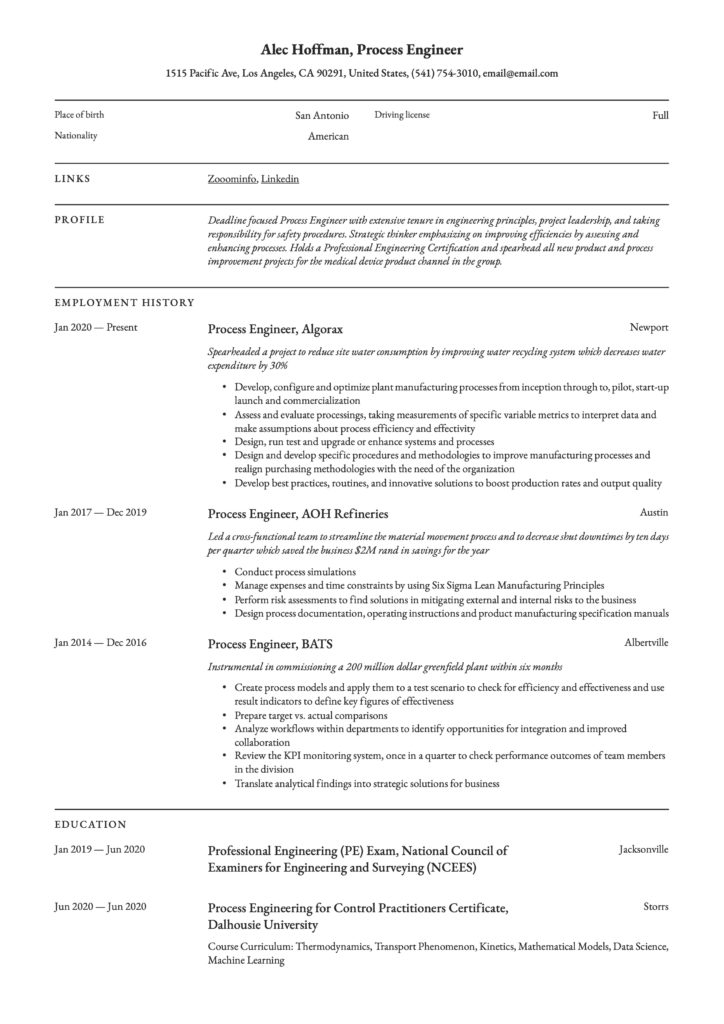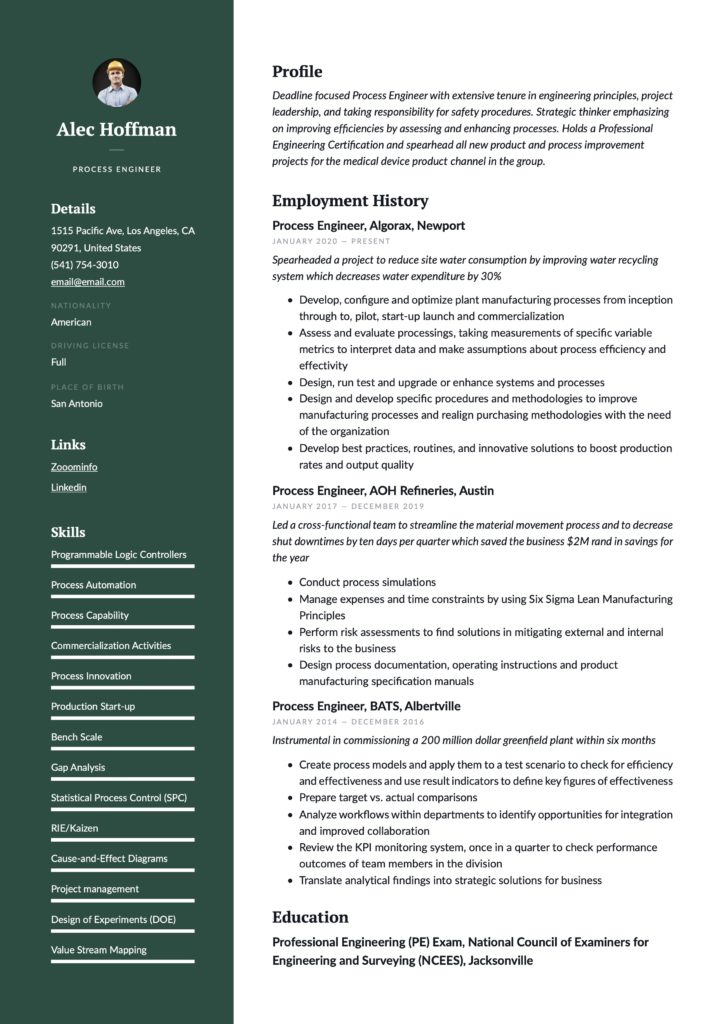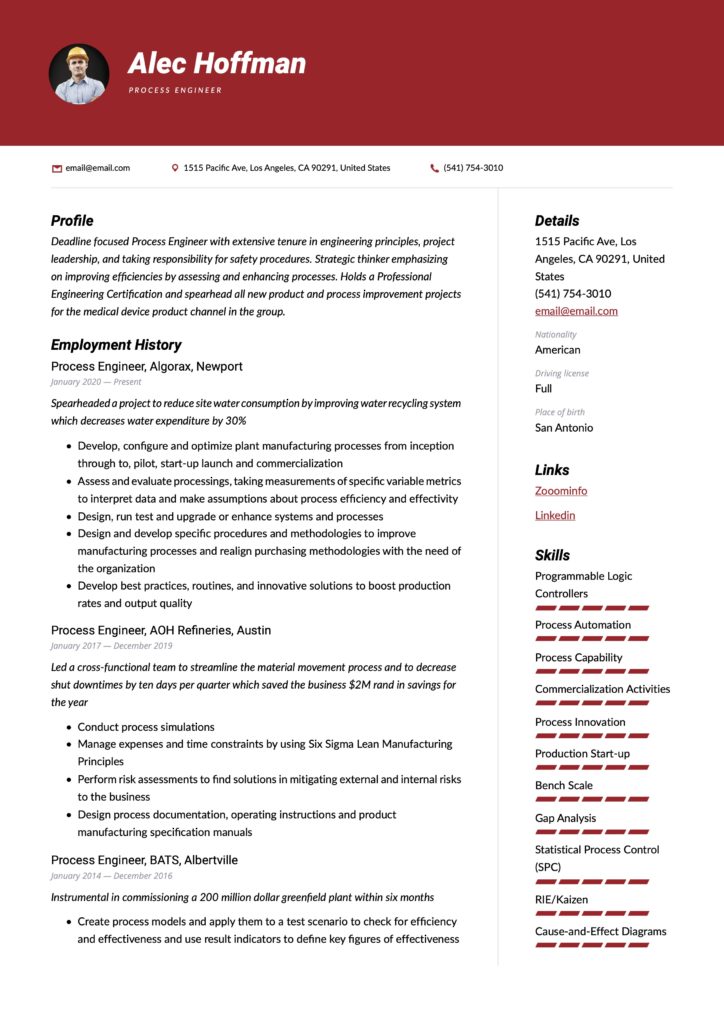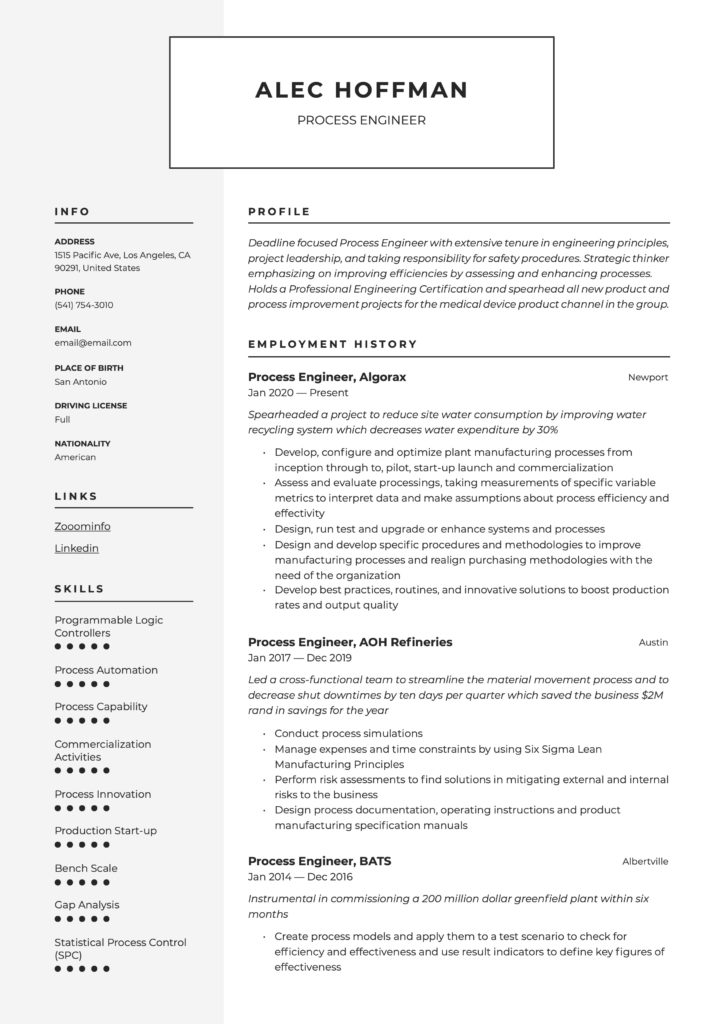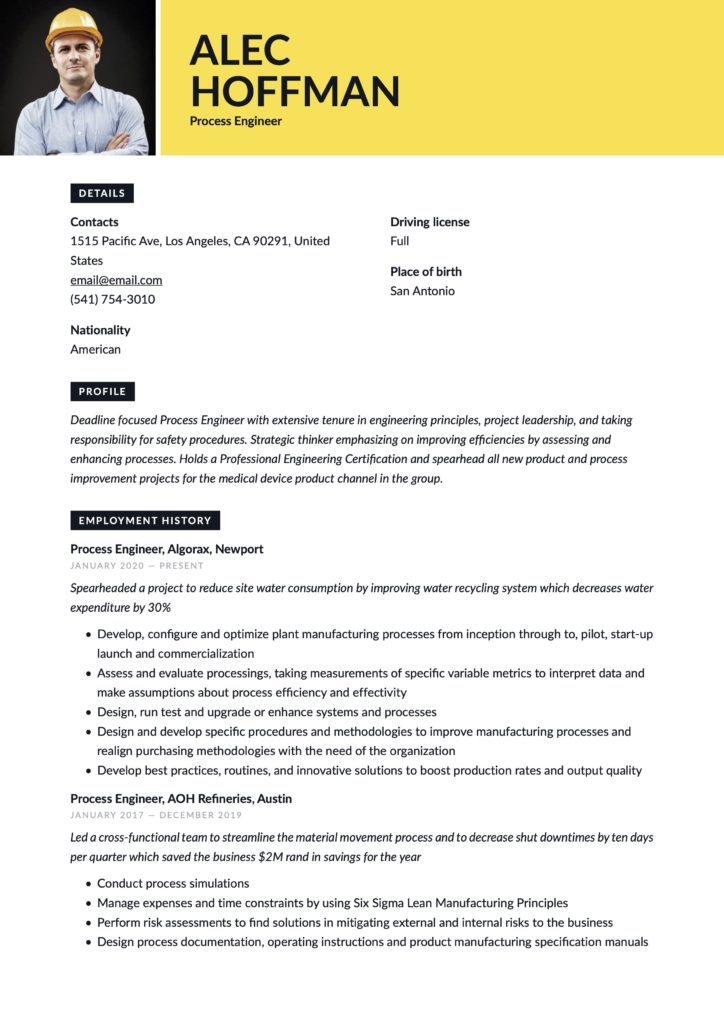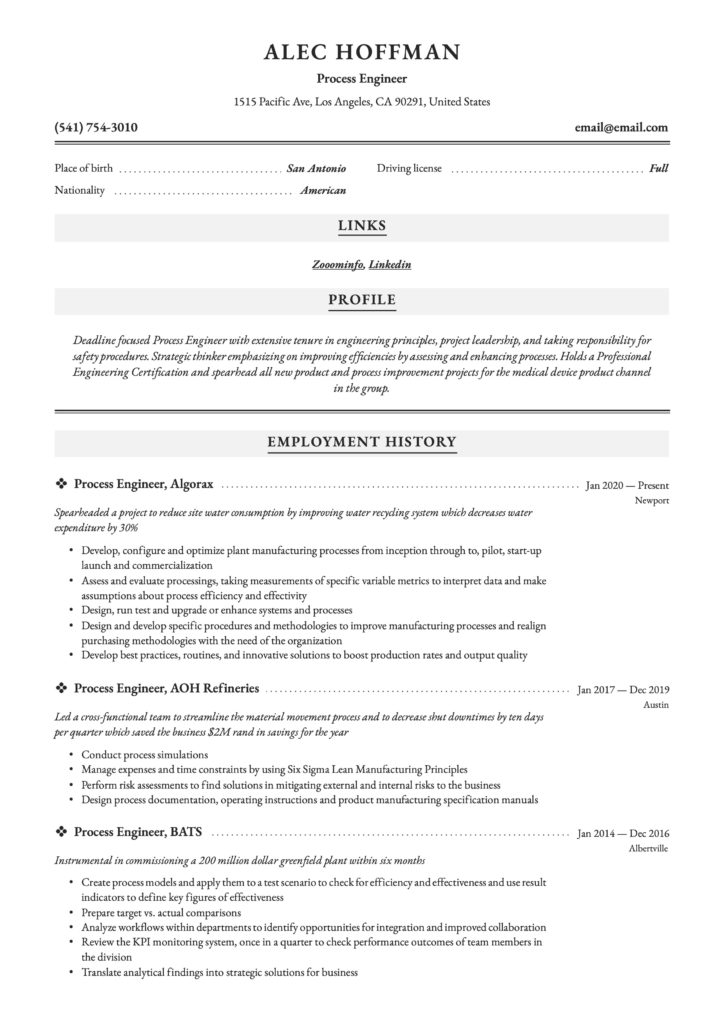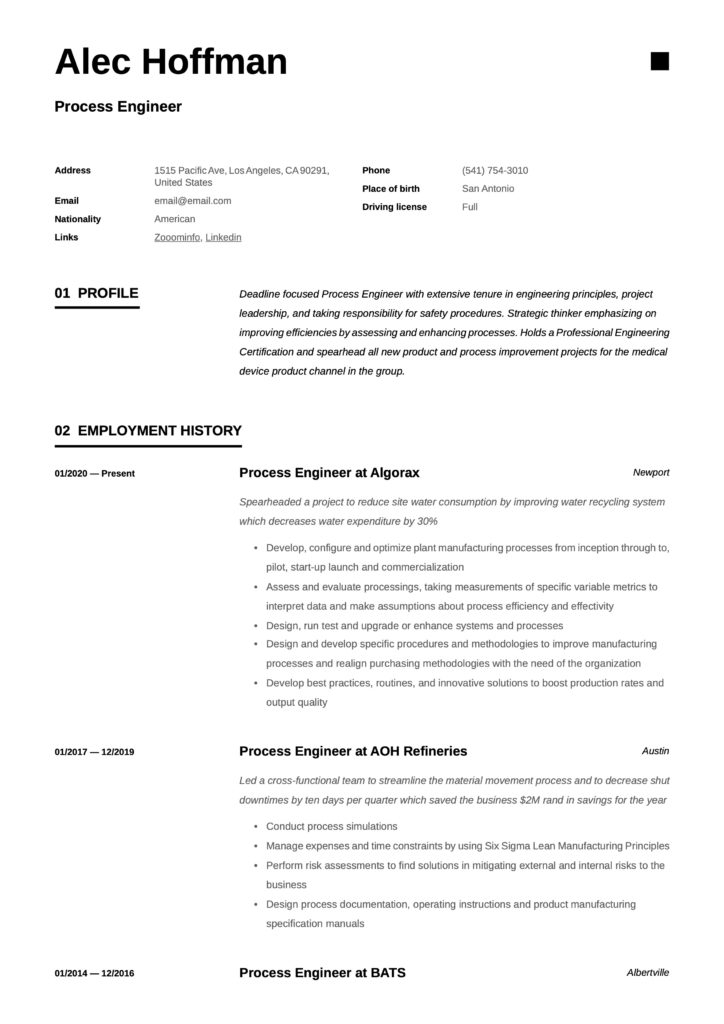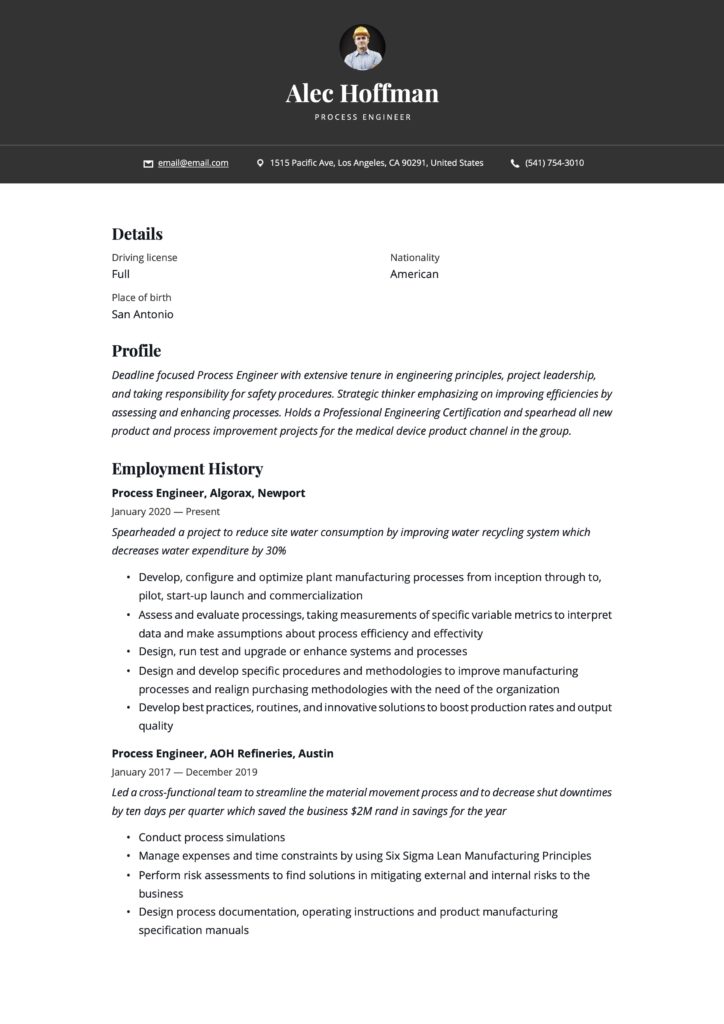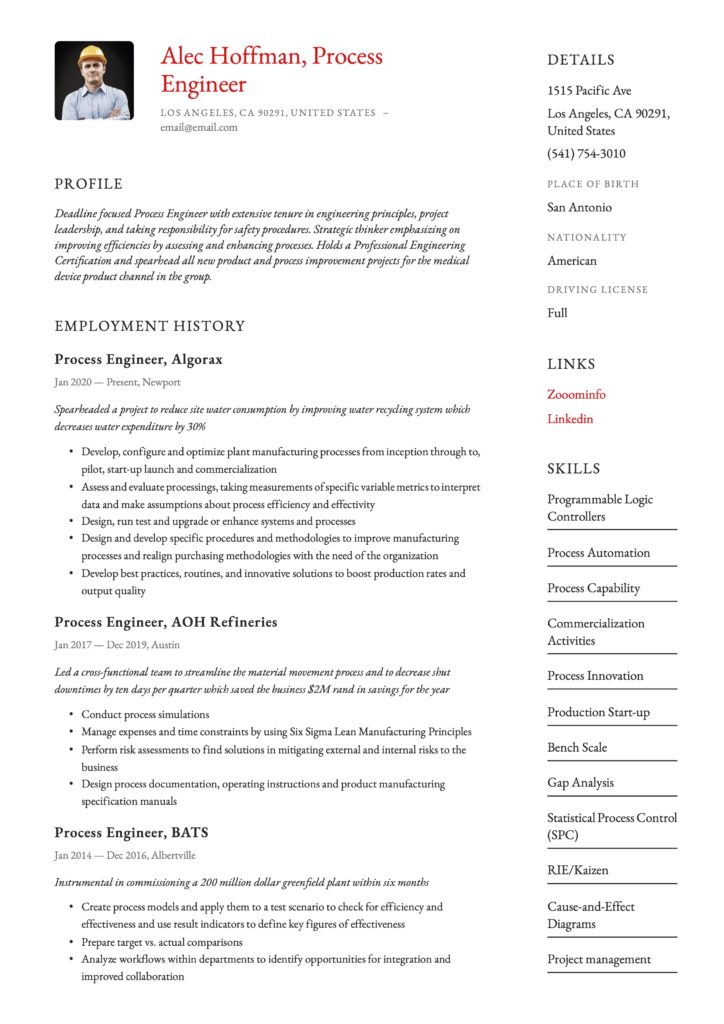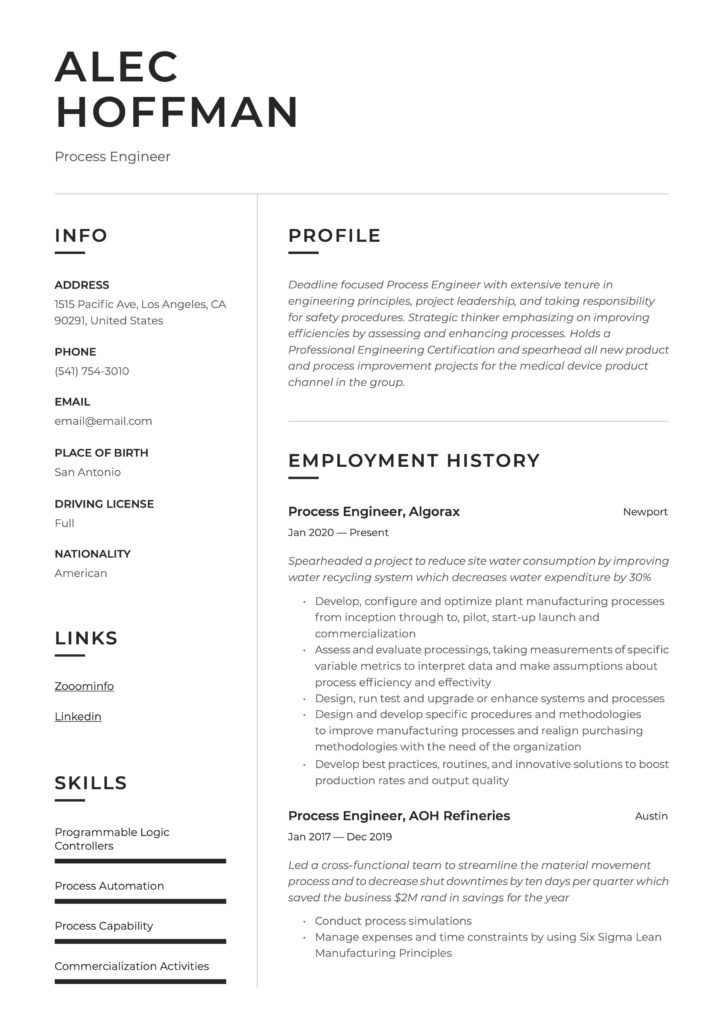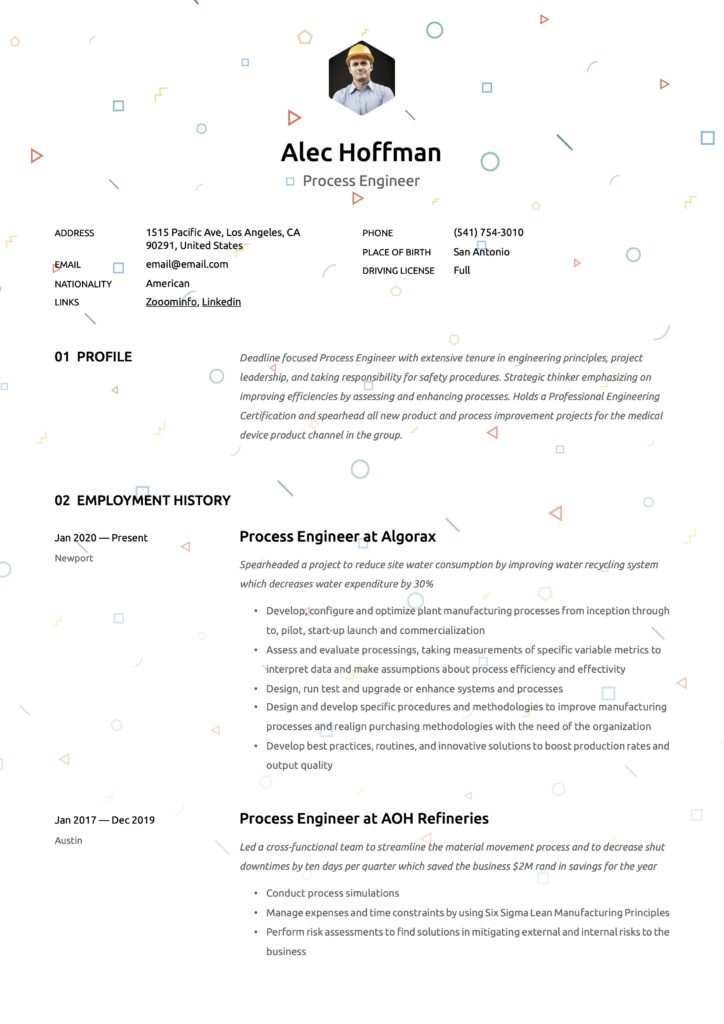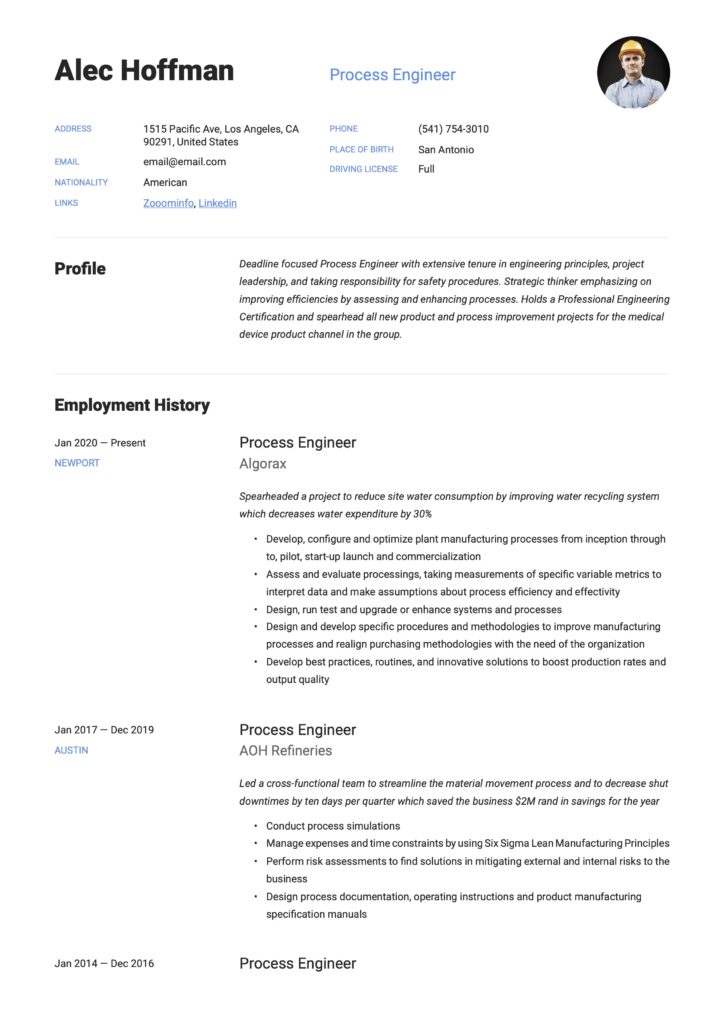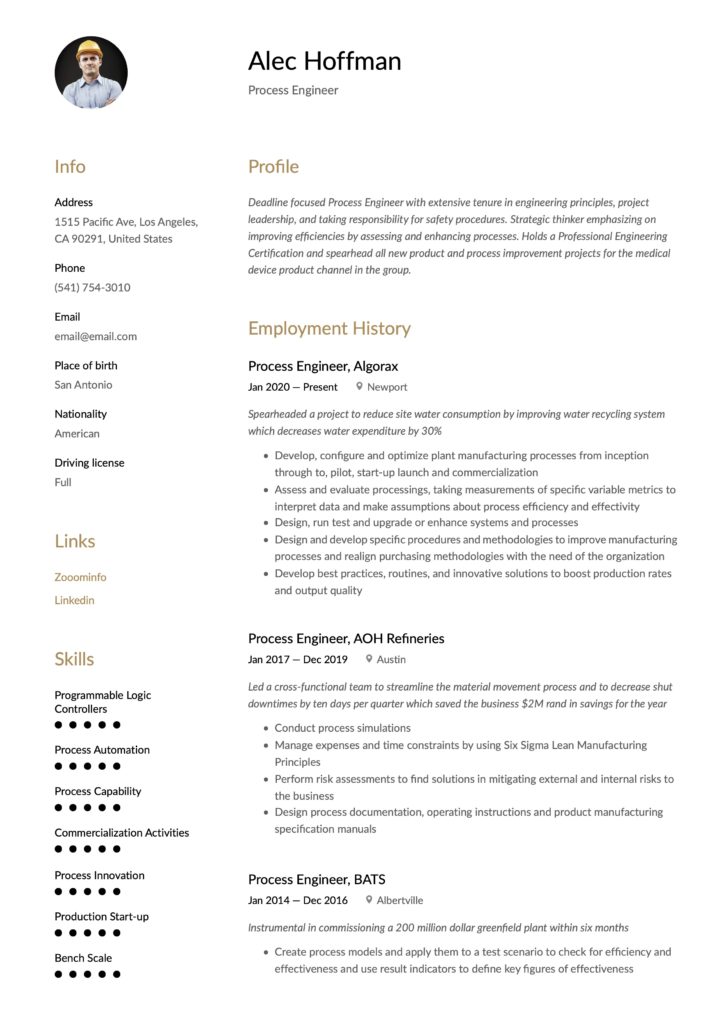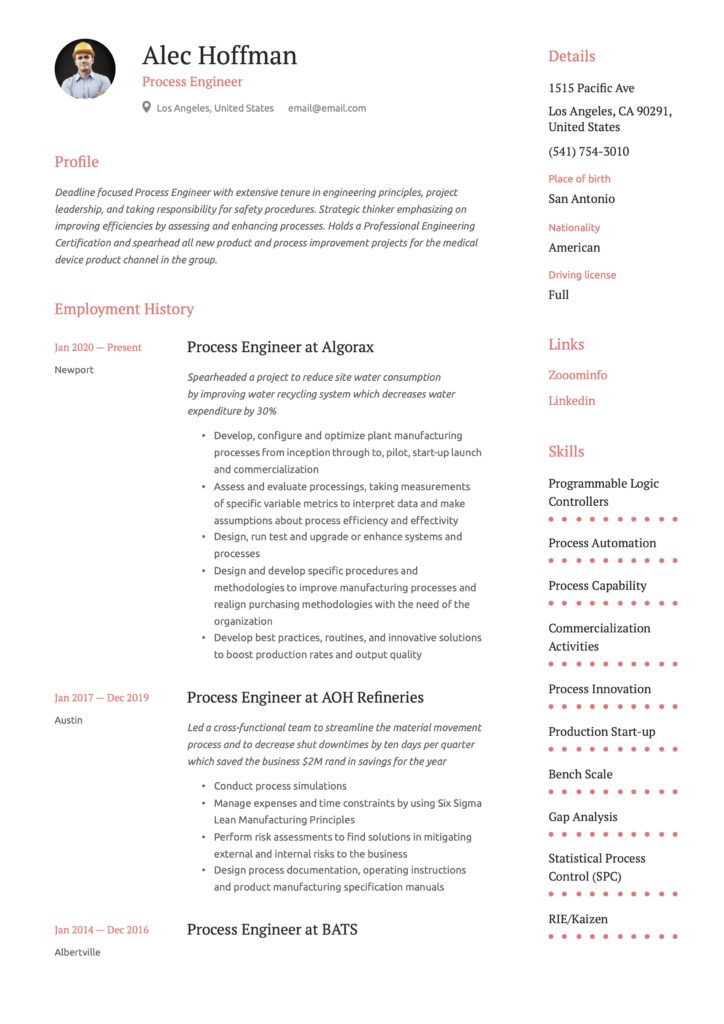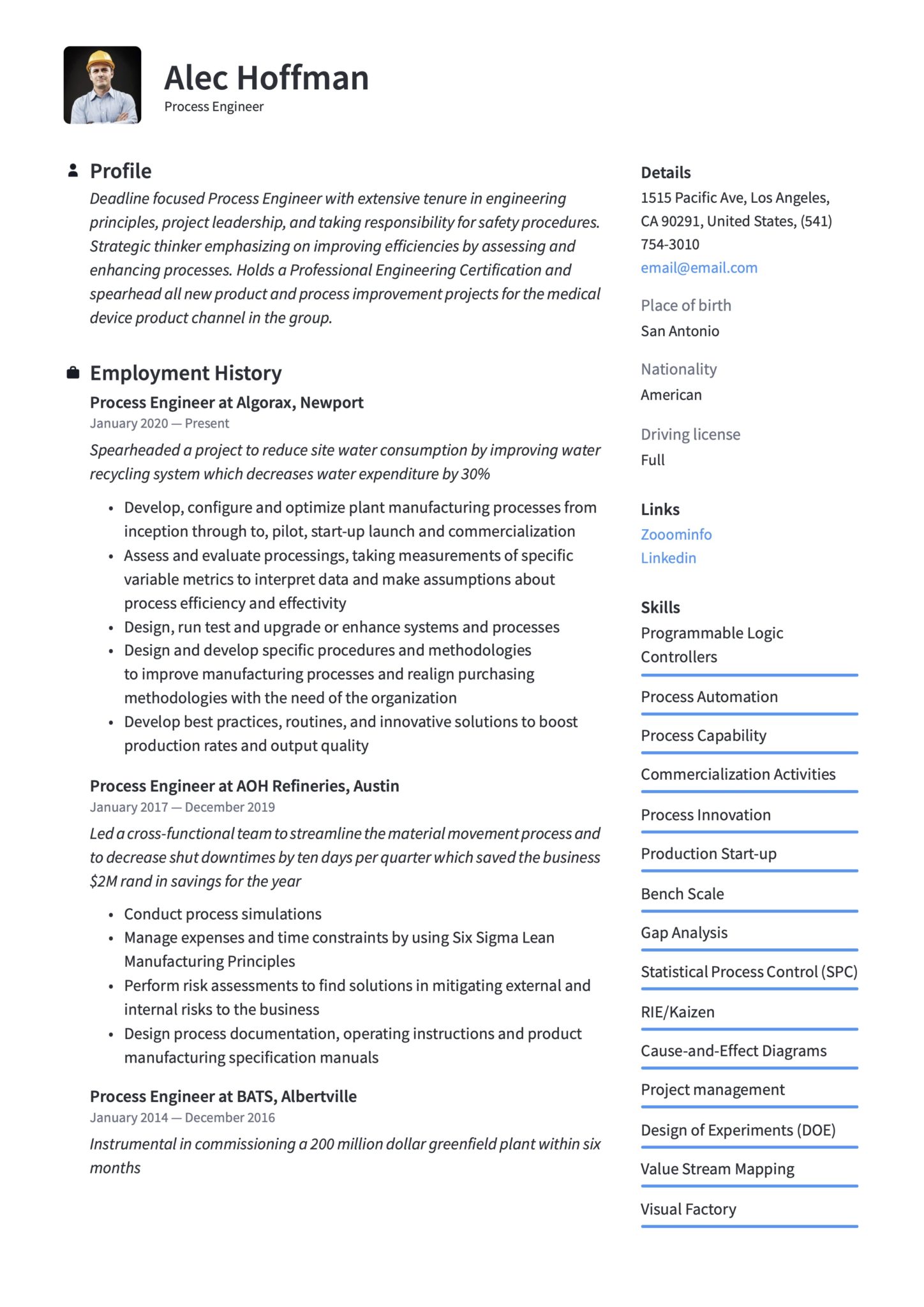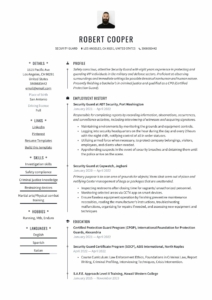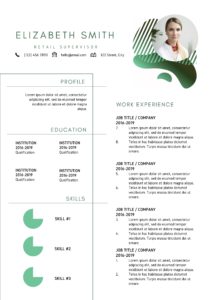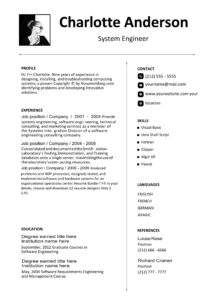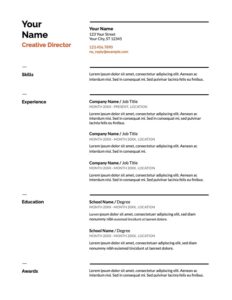Are you looking for your next Process Engineering role? As a first step, reviewing our Process Engineer resume sample is a smart strategy to follow if you aim to create a stellar resume. Process Engineers are always in demand, but you still need to stand apart from the rest of the application field when trying to secure your dream job.
Given, we are not process engineering experts, but we know a thing or two about how to write a compelling resume for a Process Engineer Job. As a Process Engineer, your job is quite comprehensive, and writing down all your projects and daily duties will end up in a process manual instead of a job application.
This is where we come in with our write-up below, jam-packed with advice on the outline of a Process Engineering Resume, what skills and experiences to highlight, and how to write a jaw-dropping resume summary that will hook the attention of recruiters and hiring managers alike.
What you can read in this article
Process Engineer Resume Examples
(Free sample downloads are at the bottom of this page)
Process Engineer Resume Writing Guide
Resume Sections
Contact Information
Place personal details at the top of the first page:
- First Name
- Last Name
- Cell Number
- Email Address
- Current Location (optional).
You should also include social media profile links such as Facebook, LinkedIn, and Instagram.
2. Career Summary:
The most crucial paragraph in a Process Engineer's Resume that should highlight superior skills, industry experience obtained, and highest academic credentials achieved. Read your summary out loud after writing it – it should take less than 15 seconds, which is roughly 4-6 concise, but informative sentences.
3. Qualifications:
Process engineers should have a Bachelor's degree in Chemical, Manufacturing, or Industrial Engineering as a minimum requirement to enter the job market. Often, employers would prefer a candidate who has either completed or is currently pursuing a Masters's or Ph.D. qualification in a particular process engineering discipline. Be sure to mention whether the institution you studied at is accredited by ABET (Accreditation Board of Engineering and Technology). Add completed degrees in reverse chronological order with the dates completed, degree title, and significant subject disciplines. If your GPA score is higher than 3.5, feel free to include that as well. Academic credentials serve the evidence of your theoretical and practical knowledge and should be presented in a separate section of your resume. If you are applying for your first job as a Process Engineer, you may want to p[lace the Education Section right below your Career Synopsis.
4. Relevant Process Engineering Experience:
The purpose of a Process Engineer is to design or oversee the equipment, systems, and methods used in a facility to transform raw materials into a final product. When explaining your job duties, focus on the top 5-10 that you are responsible for daily, weekly, and monthly. Use the job advertisement as you guide on which tasks to highlight. Also include real-life examples such as the processes you have designed/managed, raw materials transformation methods, and type of manufacturing protocols adhered to for each manufacturing facility you have worked at.
5. Other Employment Experience:
Training to become a fully-fledged process engineer takes place in the classroom (during your studies) and then also as engineering in training, where you would be assigned a senior engineer as a mentor during your training period. Be sure to include your on-the-job training or engineering internship duties as part of your work history section. If you are applying for your first job as a Process Engineer, highlight points such as type of factory, the product produced, and equipment used during the manufacturing process.
6. Skills Summary/Key Skills:
Gone are the days of dull and generic skills list indicating how flexible, dynamic, and hard-working you are. For a top-notch Process Engineer resume, your skills and competencies should resume should resonate with the technical nuances of your job and be aligned to the verbiage in the job advertisement. Following an SEO strategy when it comes to keywords will ensure that your resume is identified by applicant tracking systems and screening bots as a suitable contender. These applications are programmed to isolate and identify specific predetermined keywords and then rank resumes by suitability. The best way to present skills and competencies is by using a skills matrix feature at the end of your resume (more on this later on) engineering principles, and able to apply those principles to best support a company. Be sure to include job-specific skills.
7. Licenses/Certifications/Relevant Coursework/Training:
To work as a Process Engineer, you are required to obtain licensing by the USA Replication standards, especially if you are going to be offering services to the general public. The most common license is an FE (Fundamentals of Engineering), followed by a PE ( Principles and Practices of Engineering). Both permits are obtained by writing an exam. For the PE license, you need to have gained experience of no less than four years under a professionally certified engineer's mentorship.
What to Highlight
Process Engineers are mostly found in industries where conversion takes place from raw materials and substances into final products. A Process Engineering resume should cover all the relevant information pertinent to their experience and also to the role they are applying for.
The first point to highlight is your industry experience. For example, you may work in the pharmaceutical sector where chemical substances are transformed into drugs and medicines. Process Engineers are found in the food and beverage industries, too, where they are responsible for either developing, testing, or implementing new production processes. Process Engineers also work in the metals, mining, and oil industries where raw compounds are transformed into products via either a refining or boiling type process. Instead of just naming your industry experience by the BLS sic code, provide extra info regarding the raw materials you work with and also what the final product outcome each for each process you are involved with. Process engineers will generally work in factories, plants, and manufacturing facilities, both large and small. Believe it or not, Process Engineers are even found in financial services and insurance companies too.
Next up, Hiring Managers would want to know you technically adept you are in terms of equipment, process specifications, and use of machinery. This will also include your knowledge of regulatory and safety standards required by the state law overseeing the industry that you are working in (for example, the FDA if you are working in the pharmaceutical or medical device sectors.
The working environment of a Process Engineer may vary greatly depending on the industry that you are in. You may be walking your 10 000 steps (or more) per day around plants and factory floors or be couped up underground in a mining operation. Some process engineers work in highly specialized pharma labs were wearing a hazmat suit 24/7 is part of the job. Explain to recruiters and hiring managers what your working environment looks like, are you exposed to intense heat or freezing temperatures or do you put your life at risk daily in a contagious diseases lab where vaccines are manufactured and tested? What kind of protective gear are you expected to wear? (Sensors, hardhats hazmat suits, etc.)
Also, delve into your main functionalities. For example, if you perform computer simulations to improve or design processes, give details about the technologies and applications you are familiar with. Process Engineers are also tasked with liaising across multiple project teams from technical staff to design, research, and safety personnel, and you need to explain what those reporting structures and communication channels entail.
Competencies for budgetary management is a must-have skill in the life of the Process Engineer. Prospective employers would want to know what the value is of budgets you can approve to purchase equipment and machinery, and also negotiate service-level agreements with third-party suppliers.
Another aspect of your role is testing and quality control; therefore, you need to explain to Hiring Managers what methodologies and protocols you are using to monitor, test, and maintain equipment. This is also a paragraph where you can give detail regarding technical knowledge of compliance regulations.
Do not forget to cover your design and redesigning experience and elaborate on whether you design process flow's in a manufacturing plant, for example, or product design and tweaking or existing manufacturing methodologies. Testing, monitoring and maintaining equipment, including conducting regular tests to make sure material complies with national and internal standards.
Tools & Tech
Process Engineers rely heavily on software applications and computer technologies to perform their jobs successfully. Using a tool and tech matrix can summarize these in a proper and impressionable format.
| Sigmetrix | ArcGIS | AutoCAD |
| PTC Creo Parametric | Mathworks | Reliasoft |
| RhodesAarc | Fibre Sensors | Interferometers |
| Trimble | Graphics Imaging | Nastran |
| Minitab | MAYA | Python |
| SolidWorks | MicroVu | CATIA |
| Visual Basic | C | Visio |
| C# | Java | BlockSim |
| VeriLog | Oracle | Primavera Enterprise Project |
| Ladder Logic | Matlab | CETOL |
Career Summary
When you create your professional summary, make sure to leave this task until the end when you have already completed your resume document. This approach will help summarize your thought process, and automatically the most relevant information will come through during your thought process. A career synopsis is beneficial in technical resumes such as Process Engineering because it provides a brief overview of your best competencies, key attributes, and academic credentials all in one paragraph, which is easy to read. Most Hiring Managers will initially just have a look at the career synopsis to make their shortlisting decisions, so make sure yours are impressive.
A career synopsis should be between 4-6 lines in length and feel free to add an accomplishment or accolade to the mix to show your versatility and technical tenure.
Remember to use power verbs and specific technical terminologies, but do not go overboard. A smart move is to replicate the language used in the job advertisement and spell out names in full with corresponding acronyms in parenthesis next to each term
Examples
Experienced Summary 1
“Deadline focused Process Engineer with extensive tenure in engineering principles, project leadership, and taking responsibility for safety procedures. Strategic thinker emphasizing on improving efficiencies by assessing and enhancing processes. Holds a Professional Engineering Certification and spearhead all new product and process improvement projects for the medical device product channel in the group.”
Ten years of Experience Summary 2
“Scientific minded Process Engineer with ten years of experience in managing process development for new product manufacturing techniques in the organic chemicals industry. Comfortable working with mega teams across multiple time zones and an expert on simulation and optimization techniques for fractioning, sweetening, sour water stripping, and compressor station technologies. An exceptional track record for zero error tolerance relating to scoping and thermal rating calculations. Master User of HTRI and HTFS software”.
Four Years of Experience Summary 3
“Junior Process Engineer with a recently obtained Fundamentals of Engineering Certification and four years experience in processed modeling of industrial chemical plant operations using lean manufacturing and Kaizen principles. Completed a Bachelor of Sciences in Chemical Engineering and Cum Laude and currently pursuing a Ph.D. in Chemical Process Modelling for Nuclear Reactors. Certified is a Six Sigma Blak Belt and PMBOK professional.”
Process Engineer Job Descriptions
Your role as a Process Engineer, and the experience you have gained up to now is probably very comprehensive and enough to fill more than ten pages. Regrettably, you have only two pages for your entire resume. Focus on experience and projects for the last ten years and use the job advertisement's list of responsibilities to decide which duties to include. This may mean that you need to customize your job description section every so often to align with the positions you are applying to. In the article below, we have provided you with a full job description of a Process Engineer that you may use to tweak your duty descriptions in your resume.
A Process Engineer Stage may:
- Develop, configure and optimize plant manufacturing processes from inception through to, pilot, start-up launch and commercialization
- Assess and evaluate processings, taking measurements of specific variable metrics to interpret data and make assumptions about process efficiency and effectivity
- Design, run test and upgrade or enhance systems and processes
- Design and develop specific procedures and methodologies to improve manufacturing processes and realign purchasing methodologies with the need of the organization
- Develop best practices, routines, and innovative solutions to boost production rates and output quality
- Conduct process simulations
- Manage expenses and time constraints by using Six Sigma Lean Manufacturing Principles
- Perform risk assessments to find solutions in mitigating external and internal risks to the business
- Design process documentation, operating instructions and product manufacturing specification manuals
- Create process models and apply them to a test scenario to check for efficiency and effectiveness and use result indicators to define key figures of effectiveness
- Prepare target vs. actual comparisons
- Analyze workflows within departments to identify opportunities for integration and improved collaboration
- Review the KPI monitoring system, once in a quarter to check performance outcomes of team members in the division
- Translate analytical findings into strategic solutions for business
Accomplishments
A Process Engineering resume is often stuffed with technical terms and industry jargon, which may entail accomplishments and achievements getting lost in translation. Hence, the reason for a separate section to highlight them correctly and enhance the most prominent successes of your experience.
The accomplishment section should be filled with action-packed statements showcasing your potential value to employers and recruiters utilizing measurable improvements to processes or cost reductions you have made if you are confused now in terms of what to add, write down those projects and duties that you have felt you have had the most significant contribution. By substantiating each statement with numerical values, percentages, time frames, and frequencies you are quantifying your resumes.
Examples of Process Engineer accomplishment statements:
- Led a cross-functional team to streamline the material movement process and to decrease shut downtimes by ten days per quarter which saved the business $2M rand in savings for the year
- Conduct prototype and pilot testing in accordance to lean manufacturing principles and Six Sigma Greenbelt guidelines which improved error tolerance by 30%
- Instrumental in commissioning a 200 million dollar greenfield plant within six months
- Played a vital role in the commissioning of a $160M brownfield plant as the plant engineer and lab supervisor.
- Spearheaded a project to reduce site water consumption by improving water recycling system which decreases water expenditure by 30%.
Education
A well-devised Education Section is vital to ensure that prospective hiring managers and recruiters are aware of your technical and theoretical credentials. Present your academic background in a reverse chronological format, starting with the most recent qualification first. Name the institution attended, qualification title as well as duration from the start date to end date. Academic performance is also essential. Feel free to include GPA scores and other academic results. For formal degrees or certification and licensing, be sure to list the significant subjects and course topics too. Lastly, if you are currently still in the process of completing a qualification, indicate the commencement date as well as the estimated date of completion.
Here are some examples of education for a Process Engineer's Resume:
2020 – Professional Engineering (PE) Exam, National Council of Examiners for Engineering and Surveying (NCEES), Jacksonville, Florida
2018 – Process Engineering for Control Practitioners Certificate, Dalhousie University, Storrs, CT
Course Curriculum: Thermodynamics, Transport Phenomenon, Kinetics, Mathematical Models, Data Science, Machine Learning
2017 – Quality Process Analyst Certification, American Society for Quality, Milwaukee, WI
2018 – Certified Associate in Project Management (CAPM) Project Management Institute (PMI), Newtown Square, PA
2016 – 2018 Master's in Bio-Chemical Engineering, New York University, Manhattan, New York
2014 – 2016 Bachelor's Degree in Chemical Engineering, University of Texas, Dallas, TX
Skills
Stats have indicated that the average job seeker's resume content matches about 30% – 50% of minimum requirements and preferred skills stated by job advertisements. And this is not due to candidates lacking those skills and experience, but de to poor resume design and candidates being unaware of a strategy called resume SEO. Companies are increasingly making use of ATS (applicant tracking systems) and screening bots that are programmed to screen resumes based on previously set keywords and phrases. If your application does not include those keywords, you would automatically be screened out.
To beat the Bots and get your resume reviewed by a “human,” read through the job description a few times and highlight the keywords and phrases you deem essential. Now, we need to mirror the verbiage in your skills section employing a skills matrix.
Process Engineers require technical aptitude, which was gained through academic training and via working in the field. They also need certain personality traits called soft skills showing how they would approach problem-solving or interact with people.
Have a look at our two examples below as a starting point:
Technical Competencies
| Programmable Logic Controllers | Instrumentation | Geometric Dimensioning |
| Process Automation | Gage R&R | PPAP |
| Process Capability | APQP | Quality Systems |
| Commercialization Activities | Screening | Feasibility Studies |
| Process Innovation | Project Phases | Process Solutions |
| Production Start-up | Production Scale-up | Continuous Scale |
| Bench Scale | Batch Scale | Pilot Plant |
| Gap Analysis | Mistake Proofing | Phase Dispersion Modeling |
| Statistical Process Control (SPC) | Engineer's Aide Sinet | Poka Yoke |
| RIE/Kaizen | Exchanger Design | HTR |
| Cause-and-Effect Diagrams | Sampling Methods | Process Design Program |
| Project management | Process Validation | Aspen Hysys |
| Design of Experiments (DOE) | Pull Systems | cGMP |
| Value Stream Mapping | Visual Factory | Fluid Mechanics |
| Kanban | TPM | Vendor Relations |
Interpersonal Traits
| Emotional Intelligence | Diplomatic |
| Presentation Skills | Self-Driven |
| Active Listening | Meticulous |
| Motivation | Reliable |
| Negotiation | Process Orientated |
| Ability to Clarify and Paraphrase | Time Management |
| Stress Tolerance | Prioritization |
| Leadership | Collaboration |
| Communication | Inductive Reasoning |
| Organization | Experimentation |
| Scheduling | Independent Thinking |
| Critical Thinking | Sound Judgement |
| Analytical | Determination |
| Deductive Reasoning | Information Ordering |
Qualifications/Certifications associated with Process Engineers
| Masters in Business Administration | Advanced Diploma in Data Analytics | Advanced Quality Manufacturing Professional |
| Project Management Professional PMP | PMBOK | Certificate in Machine Learning Techniques |
| Member American Society of Quality | Certificate in Kaizen Manufacturing Principles | Associates Degree in Industrial Engineering |
| Bachelor of Science – Various Disciplines | Six Sigma Black Belt | Member Kaizen Institute |
| Certified Manufacturing Engineer (CMfgE) | Chemical Process Safety Professional Certification CPSC |
Professional Information on Process Engineers
Sectors: Power & Transmission Banking, Product Manufacturing Finance. Consumer Goods, Industrial, Chemical, Oil, Gas & Exploration, Solutions & Services, Engineering, Construction, Infrastructure Food Manufacturing
Career Type: Planning Engineering, Design, Evaluating, Project Implementation & Execution, Development, Research, Testing, Programming
Person type: Designer, Developer, Assessor, Scheduler, Facilitator, Coordinator, Overseer, Planner, Analyzer, Evaluator, Forecaster
Education levels: Bachelor Degrees to Doctorate Degrees
Salary Indication: An average of $72,905 Payscale
Labor market: Growth expected between 2018 – 2028 is 6%
Organizations: Various
Download Process Engineer Resumes
